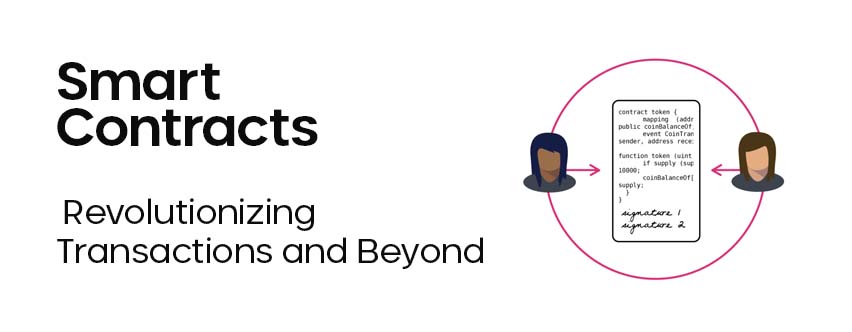In the world of blockchain technology, smart contracts have emerged as one of the most transformative innovations. Smart contracts are self-executing contracts with predefined rules written directly into lines of code. They run on blockchain platforms, such as Ethereum, and automatically execute transactions when certain conditions are met. This blog explores the concept of smart contracts, their advantages, and how they are reshaping various industries.
Table of Contents
Benefits of Smart Contracts:
- Trust and Security: Smart contracts operate on a decentralized blockchain network, ensuring transparency and eliminating the need for intermediaries. Once a contract is deployed, it becomes tamper-proof and irreversible, enhancing trust and security for all parties involved.
- Efficiency and Cost-Effectiveness: Automated execution of agreements through smart contracts eliminates the need for manual intervention, reducing paperwork and saving time. This efficiency translates to cost savings for businesses, making smart contracts an attractive alternative to traditional contract management.
- Immutability: Once a smart contract is executed and added to the blockchain, it becomes immutable. This means that the terms and conditions of the contract cannot be altered, providing a reliable record of the transaction’s history.
Comparison Table: Traditional Contracts vs. Smart Contracts
| Aspect | Traditional Contracts | Smart Contracts |
|---|---|---|
| Execution Time | Manual and time-consuming | Automated and real-time |
| Intermediaries | Often requires third parties | Direct peer-to-peer transactions |
| Security | Vulnerable to tampering and fraud | Tamper-proof and secure |
| Cost | Paperwork and processing costs | Lower operational expenses |
| Trust | Relies on trust in intermediaries | Trustless execution through code |
Stats: (Add some relevant statistics about the growth or adoption of smart contracts)
- The global smart contracts market is expected to reach $345.4 million by 2026, with a CAGR of 32.3%. (Source: Verified Market Research)
- In 2020, the Ethereum network surpassed 1.2 million smart contracts deployed. (Source: Etherscan)
FAQs:
- How do smart contracts work?
- Smart contracts work based on pre-programmed conditions. When these conditions are met, the contract executes automatically. This process is powered by blockchain technology, ensuring security and transparency.
- Are smart contracts legally binding?
- Yes, smart contracts are legally binding. However, the legal enforceability may vary depending on the jurisdiction and recognition of blockchain-based agreements.
- What industries can benefit from smart contracts?
- Smart contracts have applications across various industries, including finance, supply chain, healthcare, real estate, and more. They can streamline processes, reduce costs, and enhance security in different sectors.
Conclusion:
Smart contracts are revolutionizing the way transactions are conducted. With their decentralized, efficient, and secure nature, they provide numerous benefits to businesses and individuals alike. As the adoption of blockchain technology continues to grow, smart contracts are poised to play a significant role in reshaping industries and transforming traditional contract management processes. As businesses seek greater efficiency, trust, and cost savings, embracing smart contracts is a logical and innovative step forward.


Leave a Reply